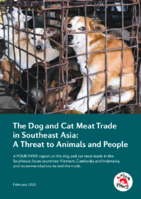
A Threat to Animals and People
A report on the dog and cat meat trade in the Southeast Asia and recommendations to end the trade
This report provides an insight into the dog and cat meat trade in Southeast Asia, with a focus on Cambodia, Vietnam, and Indonesia. While it’s impossible to quantify the exact number of animals involved due to the illicit and unregulated nature of the trade, it is of an incredible magnitude. In Cambodia, over 3 million dogs are involved, in Indonesia over 1 million dogs, and in Vietnam, over 5 million dogs and approximately 1 million cats are killed for the trade every year. All aspects of the trade from catching, transporting to slaughtering involves unacceptable levels of cruelty and suffering, making it one of the most pressing companion animal concerns of our times.
Aside from the obvious animal welfare issues, the trade also poses a significant health risk to both animals and humans. There is an undeniable link between the dog meat trade and rabies, and it is simply incompatible with regional and global rabies elimination strategies. In many cases, the trade and slaughter of dogs and cats for consumption also operates in breach of existing national disease control and prevention legislation, and encourages other illegal activities such as pet theft, which is a growing societal problem in the region.
Read the whole report here:

A Threat to Animals and People
A FOUR PAWS report on the dog and cat meat trade in the Southeast Asian countries: Vietnam, Cambodia and Indonesia, and recommendations to end the trade
FOUR PAWS recommendations
Based on extensive research, investigations and on-the-ground experience, FOUR PAWS proposes and encourage the following actions to be taken by the governments of Indonesia, Cambodia and Vietnam in collaboration with local animal welfare organisations and international NGOs such as FOUR PAWS.
- Issue strict and descriptive Directives to discourage dog and cat meat consumption.
- Publicise widely the government’s opposition to the dog and cat, meat trade on grounds of public health and safety, animal welfare, economic stability and international reputation.
- Outline and update existing laws and regulations pertaining to the dog and cat meat trade and
strengthening their enforcement. - Undertake the closure of illegal dog and cat meat trade operations to demonstrate the governments' opposition.
- Devise action plans in collaboration with key stakeholders to ensure adequate care of confiscated cats and dogs following closures of illegal establishments after the law has been fully publicised.
- Encourage those involved in the trade to transition voluntarily to alternative sources of income and livelihoods and offer incentives to facilitate the transition.
- Tighten cross-border controls and enforce existing laws pertaining to cross-border movement of dogs and cats including making available facilities for housing confiscated animals.
- Build in-country veterinary capacity to facilitate targeted humane stray animal population management strategies, including incentivised dog and cat sterilisations and vaccinations.
- Encourage responsible pet ownership and discourage the sale of pets to the trade and pet dog and cat abandonment.
- Increase penalties for pet theft and associated violence towards pet owners by the dog and cat meat traders.
Further detailed and specific recommendations are presented within the report.

